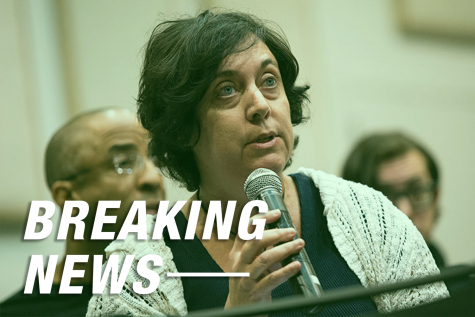College and CFAC agree to working conditions during ‘extraordinary circumstances’
March 27, 2020

“Extraordinary circumstances” have propelled the college and the part-time faculty union to agree to a memorandum of understanding outlining expectations regarding remote learning and compensation.
The CFAC union signed the Memorandum of Understanding COVID-19 Pandemic Phase One on Thursday, March 26 with the administration in the wake of the college requiring instructors to transition courses online due to the coronavirus, or COVID-19, pandemic.
A memorandum of understanding is meant to be negotiated quickly for situations that unfurl from unforeseen circumstances, such as the global pandemic. They do not have the same bargaining process as the collective bargaining agreement the two sides negotiated last spring, said Diana Vallera, CFAC union president and an adjunct faculty member in the Photography Department.
“The sole purpose needs to be how we’re going to be able to get through this pandemic with keeping in mind how we are going to focus on ensuring that our students receive what they need,” Vallera said, “and that our instructors have the protection and resources. This isn’t about any other leverage of the union. … This isn’t about the college wanting to take advantage of this time.”
According to the memorandum, union members will still be paid their full salary, even if a faculty member becomes too sick to continue teaching online or if the college decides to cancel the remainder of a class. The union and the college are continuing to bargain over compensating union members for the additional work done to transfer classes online over the two week period when classes were suspended plus spring break.
“We’re feeling more and more confident that we’re going to be able to be ready,” she said. “I would tell our students we’ll see them the week of April 6.”
The agreement also states that faculty are expected to take “reasonable steps” to transition their courses to remote learning.
Reasonable steps cannot be perfectly defined, but Vallera said professors communicating their needs and making sure they have access to WiFi or other necessary software would be considered reasonable steps to transition classes.
Additionally, adjuncts will be able to decide whether they want student evaluations from this semester to be used in future evaluations of their work performance, although Vallera still encourages students to fill out the evaluations so instructors can see how the online teaching was handled. Student evaluations are often used to consider future employment or tenure.
“We are teaching these courses in a way that has never been taught before, and we’ve had very little preparation time,” Vallera said. “This would certainly not be the time to reflect [adjuncts’ formal] evaluation. We have to acknowledge this is a unique time.”
For Vallera, key points agreed upon in the memorandum included access to technical support and resources for faculty—such as access to the video conference software Zoom—and protection of adjuncts’ intellectual property rights for work they may put online for students to reference.
The agreement between the union and college may come in multiple phases because the situation is constantly changing, Vallera said. The college and CFAC are already negotiating a second “return to normal operations” memorandum and hope to finish negotiations by Friday, April 3, but Vallera said that is not a hard deadline.
The current memorandum will expire when the “pandemic situation expires,” she said.
The Chronicle’s repeated requests for comment from college administrators have gone unanswered as of press time.
“The parties acknowledge their commitment to the mission of the college and the indispensable role that part-time faculty play in fulfilling that mission, and the commitment that the part-time faculty have to serving the students at the college,” said the CFAC steering committee in a Friday, March 27 email to union members. “Neither party is attempting to use the COVID 19 pandemic as a way to leverage any advantage. This MOU helps to provide the security, protection and resources to help ensure that our students receive the instruction needed to advance in their program.”







